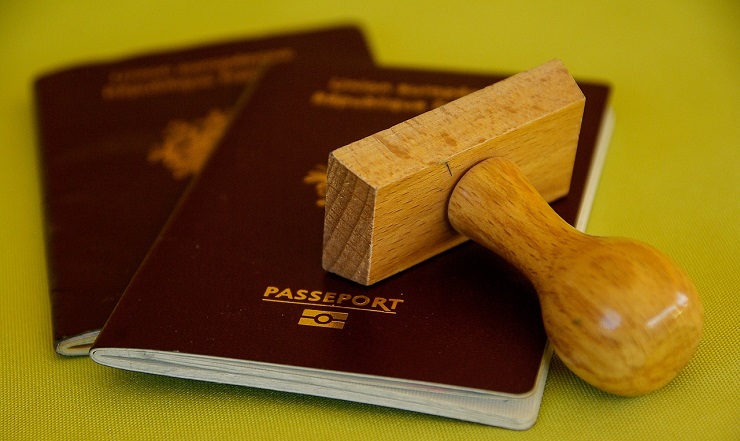Wondering 'Has My Identity Been Stolen Abroad?' Don't Panic
Identity theft can be a particularly harrowing experience for expats because it can underscore the vulnerability you always feel to some degree in your new country.
Even when you’ve put in the time and energy to connect with other expats and built up a network of friends and business contacts, having someone steal your identity can leave you feeling all alone.
And while expats as a category don’t appear to be specifically targeted by identity thieves, anyone who travels abroad for business frequently is 66 percent more likely to become a victim of identity theft, LifeLock reports.
Here are the steps you can take to protect yourself against identity theft, and what you can do if you are targeted.
Identity Theft: What To Do and How Expats Can Protect Themselves
Guarding Your Offline Documents
Identity theft gets illustrated as cyber crime or something limited to the realm of hacking. In reality, however, people often get their data stolen in the most mundane ways.
“Is your desk in open sight?” personal finance journalist Jean Chatzky writes. “Could someone walking past see information that ... [could] be used to impersonate you for the purposes of getting credit or a job? The more data points a smart id theft can compile on you, the better a shot he or she has at success.”
This also extends to the places where you keep these documents. If you keep all of your sensitive materials in one place, you risk turning your storage space into a treasure chest. “Don’t keep your cards, money and passport all in one place,” the team at AIB writes. Instead, spread the risk around by having your documents stored in several places. “Take good note of where you keep them and this makes it more difficult for you to lose them or have them all stolen.”
Chatzky reminds everyone to pay attention to what documents they leave out in the open. Anything containing sensitive data that can be discarded should be run through a paper shredder, she says.

Protecting Credit Cards and Bank Cards
The financial information (and access to money) your credit cards and bank cards contain are particularly valuable to thieves, who get increasingly more sophisticated in their methods of breaching that data.
Among the most common scams is the use of card skimmers at vulnerable cash machines. These can swipe the data from your bank card and give thieves direct access to your bank account.
Sid Kirchheimer, who has made a career out of researching such scams, offers several good tips at the AARP blog for identifying a cash machine that has been compromised:
-
Go for cash machines inside of bank lobbies. Their locations make them far less likely targets for anyone who would try to install a skimmer.
-
Check the card slot on the machine for a flashing light. If the light is obscured, it may have been tampered with.
-
Check the keys, particularly “Enter,” “Cancel” “Clear.” If those keys stick, someone may have attempted a less sophisticated method of tampering that leaves your session open when you step away from the machine.
Writer Jess Signet points out another kind of scam to be aware of. “If your card has an RFID chip in it (and can be ‘tapped’ to pay), it may be vulnerable to RFID skimming, she writes at YouRoam. “Unlike with traditional credit skimming, the criminal just needs to be within a foot of your card. A small device can actually scan the card’s information and store it for later use.”
However you protect your cards, be sure to turn on fraud protection alerts at your bank, and regularly check your accounts for any suspicious activity.
Securing Your Personal Technology
Your computer and mobile devices are the richest sources of personal data, whether a thief accesses them directly or remotely.
And device security isn’t a one-time measure, but an ongoing practice. The UK’s ActionFraud centre has a helpful infographic that covers the basics of security, which includes regularly changing passwords and enabling two-factor authentication wherever possible.
For iPhone users, the recent legal battle between the American FBI and Apple has elevated the conversations about how users can secure their smartphones. For instance, The Intercept’s Micah Lee reported in February that a random 11-digit passcode is strong enough to protect a phone from brute-force entry. That means if someone finds or steals your iPhone, they would need access to a Herculean amount of processing power just to crack the passcode.
Identity theft expert Robert Siciliano has a few more personal tech best practices that will help safeguard your data:
-
Only use WEP, WPA and WPA2 networks when accessing public WiFi. Even then, only use an https connection, which is indicated by the little padlock beside the URL in your browser.
-
Back up your data daily, both to local storage and cloud storage.
-
Don’t access any sensitive websites such as your online banking service from a public computer.

Automating Your Protection
As mentioned earlier, automatic alerts on your bank accounts are a must, and you can create a similar passive security layer for your personal devices. “Turn on remote tracking and wiping software on your phone so that if it is lost, you can locate and/or wipe the data off from anywhere,” writes the team at security company Sileo.
Additionally, if you are going to be abroad for a relatively short period of time — maybe a year or less — look into freezing your credit, White Lighthouse Investment Management founder Jonathan Lachowitz writes for the Wall Street Journal. A credit freeze can make it more difficult for identity thieves to access your credit report or open a new line of credit in your name. However, this option only works for expats who are certain they won’t need a new line of credit while abroad.
Finally, writer and expat Susan Johnston Taylor, also writing for the WSJ, suggests it might be worth looking into signing over power of attorney to a trusted person back home. That person could act as a person on the ground in case of an emergency or in case you sell a large asset back home. “Some expats give a parent or other trusted relative power of attorney if they need someone to act on their behalf and finalise the sale of a car or house after a move,” she writes.
Expats who retire abroad could especially benefit from having such a legal arrangement. “Aging populations often set up financial power of attorney in case they’re incapacitated so that a child or niece or nephew can pay other bills or do things on their behalf in case they’re incapacitated. The need varies depending on your situation, but, of course, be careful who gets that power.”
In the Event of a Personal Data Breach
Even the best-laid security plans can falter, however, so it’s good to have a mental plan for what to do in case someone does steal your personal information.
The Identity Theft Resource Center says your first step should be to assess the damage done, audit what’s missing, and wall off the intrusion as much as possible.
If your credit or bank cards have been stolen, contact the relevant financial institutions and close accounts tied to those cards. When you open new accounts, be sure to use a completely new password. Likewise, if someone has gotten into any financial accounts and locked you out, you need to act quickly and inform the financial institution.
Nerdwallet has an excellent infographic that outlines a few further steps:
-
Inform the local police of the theft. Make sure they file a report and that you get a copy.
-
Freeze your credit.
-
Be prepared to contact a legal professional to help you navigate the laws that have jurisdiction.
images by: ©halfpoint/123RF Stock Photo , ©flynt/123RF Stock Photo, Jackmac34










.jpg?width=600&name=christian-allard-RlNXFBkOU2k-unsplash%20(1).jpg)
